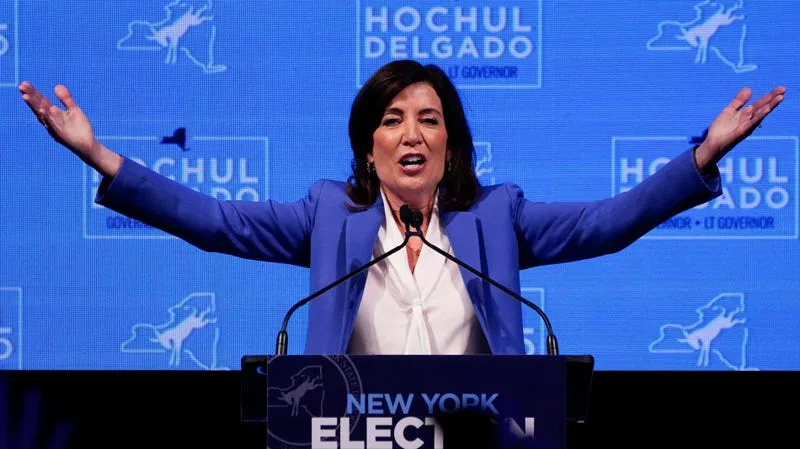
In a historic regulatory step, New York has become the first U.S. state to bar certain types of cryptocurrency mining. Governor Kathy Hochul signed a bill on Tuesday that triggers an immediate moratorium on energy-intensive “proof-of-work” crypto mining powered by fossil fuels. For two years, no new permits for such mining operations will be issued and no existing permits will be renewed, according to the law (A7389C).
The bill cites the heavy climate and infrastructure costs of crypto mining in its reasoning. On top of the moratorium, the new law mandates that New York’s Department of Environmental Conservation come up with an environmental impact statement assessing proof of work’s statewide impact within a year, that can then be used to inform future policy.
Proof-of-work mining uses large networks of computers to generate encrypted blocks on the blockchain. Basically: computers compete to solve long strings of useless, arbitrary, and increasingly complex math equations that verify their intent, and then they tabulate and track transaction data across the network. The end result of all of this is that the winning miners end up with a portion of new crypto coin at the end, making mining lucrative.
Proof-of-work is intended to keep the blockchain decentralized and fraud-free through an incredibly high cost of participation, and that cost is paid via energy. Outside the U.S., European regulators have also been considering restrictions and bans on the practice. Crypto mining is a huge drain on the power grid, and the industry as a whole produces a massive amount of carbon emissions.
“I am signing this legislation into law to build on New York’s nation-leading Climate Leadership and Community Protection Act, the most aggressive climate and clean energy law in the nation, while also continuing in our steadfast efforts to support economic development and job creation in upstate New York,” wrote Hochul in a memo shared with Gizmodo, explaining the Governor’s reasoning behind her approval of the law. “I recognize the importance of creating economic opportunity in communities that have been left behind. This is why I will continue to invest in economic development projects that create the jobs of the future…while also taking important steps to prioritize the protection of our environment,” she added.
Worth noting: the moratorium still allows for crypto operators who rely on the significantly less energy-intensive “proof of stake” model. And miners are allowed to continue running and building proof of work set-ups that rely on non-fossil fuel sources like hydroelectric, nuclear, and wind. But even that takes valuable green energy, which could be going towards more necessary uses, out of the grid.
The newly signed bill was approved by the state senate back in June, but Hochul remained non-committal on it up until this week. Pro-crypto lobbyists (and NYC mayor Eric Adams) pushed hard for the governor to veto the bill, expressing concerns that the regulation would stifle business interest in the state and prevent industry growth. Crypto proponents also worried that the New York bill will eventually lead to similar legislation being passed elsewhere—as New York has a reputation as a Democratic trendsetter, according to a report from CNBC that extensively quotes industry voices. But crypto has already been doing a pretty good job of stifling itself over the past few months.
Most recently, the collapse of one of the largest crypto exchanges, FTX, has sent shockwaves through the blockchain, tanking bitcoin value and leading to other exchanges being downgraded. FTX imploded largely because of founder and CEO Sam Bankman-Fried’s poorly judged and likely illegal management of investor funds. And whether or not courts end up holding SBF accountable for all of that disappeared money, it’s undeniable that crypto is riddled with scams.
Also worth considering: the crypto industry provides value to a very small number of people. It’s not exactly a public good. And as Texas has demonstrated, crypto mining is a big drain on the energy grid—maybe as much all of the households in Houston.
New York has experienced an increase in crypto mining operations in recent years, and in some cases the industry has negatively impacted communities— even separate from the climate downsides. In Plattsburgh, an influx of miners led to soaring winter energy bills and mass noise disturbances, while producing no local economic benefit, according to a report from MIT Technology Review. “From 2016 to 2018, crypto mining in upstate New York increased annual electric bills by about $165 million for small businesses and $79 million for individuals,” the article notes.
So, residents of Plattsburg are likely heartened by the new regulation along with environmental groups. “This first-in-the-nation law should set the standard for every other state where crypto miners are coming in, extracting resources, and wreaking havoc,” said advocacy non-profit, Earthjustice, in a statement. “We’re very much looking forward to the DEC’s fact-finding review, which we’re confident will affirm…[that] crypto mining is a major threat to climate security and needs to be closely regulated.”
The Nigerian Government has taken legal action against the Chairman of Zinox Group, Leo Stan…
Nigeria striker Ademola Lookman said that switching his playing nationality from England to the Super…
Popular Nollywood actress Seyi Edun has extended an olive branch to her colleague and husband’s…
The Catholic Bishop of Sokoto Diocese, Matthew Kukah, has claimed that there is a lack…
Prophet Odumeje has made a bold and unapologetic declaration about the authenticity of the miracles…
Nigerian comedian cum filmmaker, Ayo Makun, better known as AY, has clarified the claims of taking…